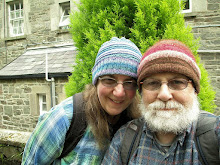
July 20, 2009
We’re on our way from Hardin, Mt to Glendive, MT. We spent the weekend in Hardin. It was depressing. It was a study in contrasts. Downtown was in pretty sad shape, with lots of empty storefronts and a few businesses valiantly trying to make it. There were Native men wandering around or lolling around in doorways, clearly intoxicated. It was sad and reminded me a lot of Kotzebue, Alaska. This is unfortunately not uncommon in areas around reservations. Alcohol and drug abuse is far too common. It affects all ages and women and men, of course, just as it does with any other group of people. But there is, in Alaska at least, a problem among Native men. Some have written about this as a problem of extended adolescence. This makes sense if you consider the circumstances. There is much talk about Native people having to walk in two worlds. To some degree we all have to do that. But the situation is a little different when you are coming from a village and have been brought up to expect certain things. You are probably not going to live a total subsistence lifestyle, but sometimes hunting season means you will miss some school. School is, in any case, not valued by some people. And if you go too far, you may get some negative feedback from others in your community. I remember talking to a classmate in my Inupiaq Eskimo language class at UAF. She was talking about the new head of Alaska Native Studies in a very negative way. I was confused and asked her why she was so upset. It seemed to me better to have a native woman at the helm instead of the white guy that was there before. She looked at me and sneered, “She’s not Native, she went to Harvard.” Ok, then. It’s no wonder people suffer from identity crises when there seems to be no place for them. You need cash now, no matter where you live, so subsistence can be a part of your life, but you’ll probably have to do something else, too. And then if you try to further your education, you get dissed by people in your community. I will point out that the young woman who was so dismissive of this professor was at college herself. But the University of Alaska Fairbanks is not Harvard. I would have liked to have known exactly where the line was that made you no longer a real Native person. Anyway, I don’t know much about the specific difficulties faced by people in the Crow Agency, which is just outside of Hardin, but I am sure there are many.

We went to the grocery store and I was appalled. You read about this stuff, but I think that, with the exception of Kotzebue, where very high prices are to be expected, I have never seen this kind of thing in person. A container of oatmeal that I am used to paying around $2 for was over $4 and a box of the packets was over $5!! Cheese puffs and pork rinds were, however, available for less than $2. Junk food was abundant and cheap. Real food was expensive. For people living in a very depressed community such as this, such a situation will only make matters worse.
As we drove downtown the first evening we were there, we saw these banners hanging on lampposts.


One simply said, “Welcome.” One said, “Catch the Spirit.” The last one said, “Welcome to Hardin. It’s a great place to be.” It seemed pretty pathetic, really. It did not seem at all like a great place to be. In the weekly paper there were 3 job listings--all with the county. I am not sure where people would work. There’s the grocery store and a little cluster of fast food outlets--complete with casinos, which seem to be everywhere in Montana--gas stations and motels. There are a few businesses downtown. Mostly there are empty buildings. There was a coal fired electric plant across the street from the campground. Some people must be doing somewhat well, because there was a mix of run-down kinds of homes alongside more kept-up places.

And of course, there is the brand new shiny prison built just off the main road in town. The barbed wire sparkles in the sunlight. It sits empty. This is why they want to bring in the prisoners from Guantanamo Bay. They have the beds, they say, and they want the jobs. But I am not sure who would get those jobs, even if the prisoners did go there. Probably not the people of Hardin.
The last day we were in Butte, we were talking to one of the people who works at the campground. He and his wife travel each summer to a different KOA to work. We asked him what he thought of Butte. He said he liked it, but there were problems. Young people were leaving and not coming back. His opinion was that Butte is dying. I thought it was a good point. It applies to Hardin even more. It was sad to see.
